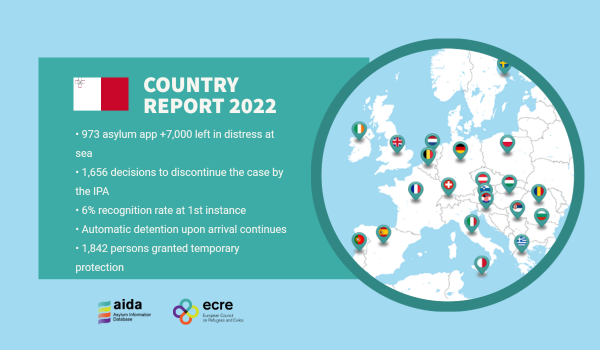The updated AIDA Country Report on Malta provides a detailed overview on legislative and practice-related developments in asylum procedures, reception conditions, detention of asylum seekers, content of international protection, as well as procedure for and content of temporary protection in 2022.
In 2022, a total of 973 applicants lodged applications for international protection in Malta, a decrease from 1,281 in 2021, mainly from Syrians (243) followed by Eritreans (93) and Ukrainians (92). The substantial drop in arrivals is reported to be a direct consequence of Malta’s involvement in pushback incidents and reluctance to carry out rescues at sea: in 2022, more than 7,000 persons in distress at sea are reported to have been ignored by the authorities and Malta was accused of directly involvement in at least 14 pushback incidents. UNHCR recorded 444 sea arrivals to Malta, a 47% decrease from 2021.
The overall recognition rate at first instance was 6.1%, with 187 persons being recognised international protection out of 2,626 decisions in total. Of those recognised protection, 92% were recognised subsidiary protection (172) and only 8% refugee status (15). 68% of rejections did not look at the merits of the case (1,656). Notably, all applicants from Egypt, Bangladesh and Senegal received inadmissibility decisions based on the safe country of origin concept. The majority of pending cases at the end of 2022 concerned applicants who would, prima facie, eventually be granted international protection in Malta, that is Syrians (359), Eritreans (178) and Somalis (166).
Many elements of the asylum procedure continue to be highly problematic, with long waiting times, reportedly very low quality of assessment, ineffective appeals. The unlawful accelerated procedure was strongly criticised by the European Court of Human Rights in a judgment of December 2022.
Although the mandatory COVID quarantine was done away with in May 2022, all asylum seekers rescued at sea, including vulnerable applicants and unaccompanied minors are still subject to automatic detention for several weeks after their arrival under the Prevention of Disease ordinance. During this detention period, they do not have access to any external entity, including NGOs, etc. Moreover, applicants coming from countries of origin where returns were deemed feasible continued to be automatically detained, including unaccompanied minors from such countries pending age assessment or rejection of their claim. Judicial review of detention continues to be completely ineffective, taking place through mass hearings without individual assessment.
Concurrently, as of 2 April 2023 a total of 1,842 persons were granted temporary protection in Malta, the vast majority being Ukrainian women. Contrary to international protection, procedures were very fast and eligible persons received status within days of applying. Persons considered ineligible for temporary protection were offered several options, and mainly chose to return to Ukraine through informal travel arrangements or to apply for international protection. Although temporary protection holders are allowed access to open reception centres, they refused to do so given the abysmal living conditions and mainly secured accommodation privately. However, according to State authorities, any return to Ukraine, regardless of its duration or purpose, may result in a withdrawal of temporary protection and the person would then have to apply again.
For further information:
- Find comparative information in the Asylum Information Database (AIDA) managed by ECRE

